Meal replacements are an easy, effective, and convenient way to receive the proper nutrition that your body needs, especially if you’re working out. The purpose of meal replacements (MR) is in the name, to be used in place of a meal. A good serving of protein and little carbs should not substitute a meal. Many protein shakes that claim to be meal replacements have high amounts of protein, and very little amounts of carbohydrates. Whether the goal is to gain mass, or to lose weight, a good MR should contain a good amount of both protein and carbs. The protein is necessary for muscle recovery and rebuilding, and the carbs are necessary to maintain energy levels throughout the day. Alternatively, four ounces of meat and a serving of fruit can provide the same nutrients as a meal replacement shake. Considering the busy lives of most Americans today, a MR makes life easy. It’s tough to warm up a piece of chicken and peel a banana while driving to work. It’s much more quick and easy to sip on a shake or eat a bar during a commute. In addition, there’s much more planning involved if a piece of meat and fruit is the route taken. Many people forget to plan ahead, or life takes over and they get too busy and miss meals. When meals are missed, many individuals allow their hunger to increase to the point where they just need to get something, anything, into their stomach. In these circumstances, when that point of hunger is reached, it becomes very easy to fall off track and go for quick fixes that should not be in the diet of a fitness goal oriented person. A MR doesn’t only help by being convenient, but also helps by being readily available for when people find themselves in these situations. All in all, a MR helps to keep on track. Are they necessary? No. Are they useful? Absolutely. Meal replacements help to serve as an insurance policy for when there are no other good and healthy options available.
What Meal Replacement should I buy?
A MR that has AT LEAST 15g of both carbs and protein is usually good. In addition to looking at protein and carbs, the ingredients label must also be checked. Most supplements are not regulated by the FDA (Food and Drug Administration). Therefore, they are allowed to have what is called a proprietary blend. A proprietary blend means that the supplement company may mention what ingredients are in the product, but not the amounts of specific ingredients. Supplement companies argue this and say the proprietary blend is their “secret formula”. When it comes to what is going into your body, there should be no secret about it. It can be problematic if the amounts of certain ingredients being consumed are not known. Look for a MR that doesn’t contain a proprietary blend so that you know exactly what you are consuming. One supplement company, Advocare, does a great job on not only elaborating on exactly what and how much is in their products, but they also have a comprehensive ingredients list that explains the purpose of every ingredient that they use. This allows consumers to feel confident in knowing the amounts AND the reason for each ingredient. The best way to be a smart consumer is to know exactly what you are consuming and why you are consuming it. Without a doubt, meal replacements are a very effective way to stay on track and maintain proper nutrition.



